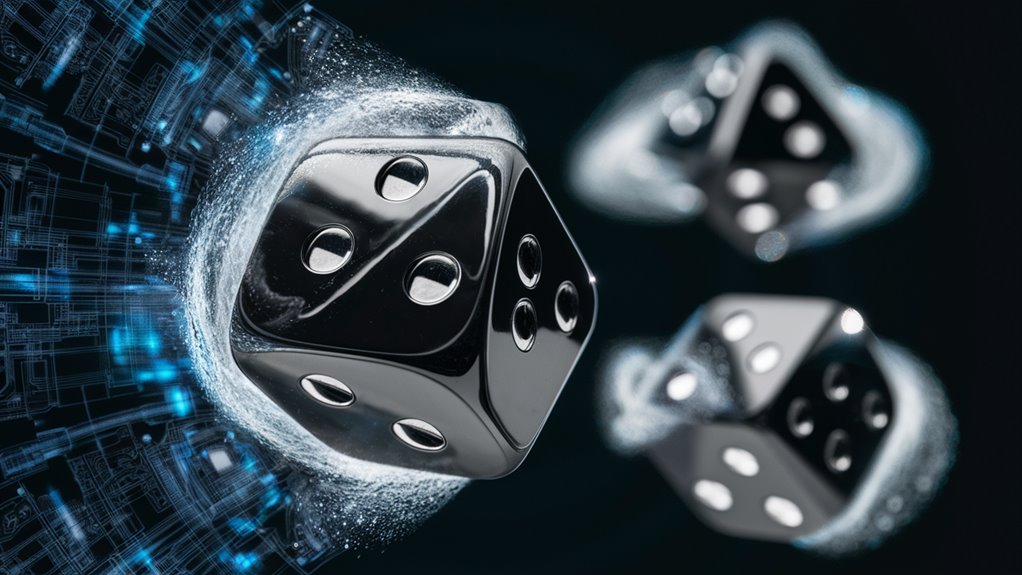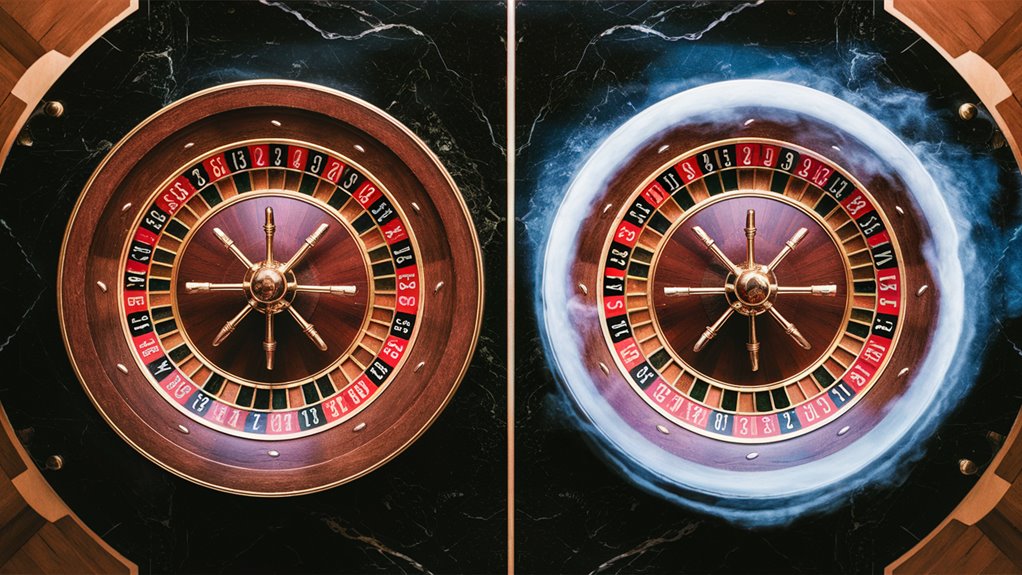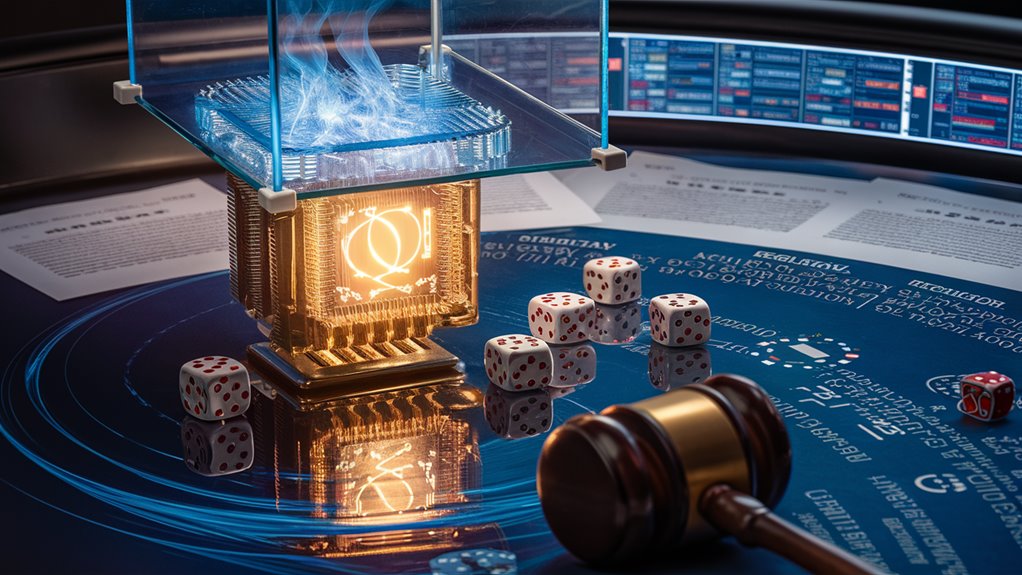Ever wondered how quantum computing might shake up your chances at the casino? Well, let’s talk about something that’s about to change the gambling world as we know it. You know how traditional computers crunch numbers one after another to calculate odds? Quantum computers are totally different – they can look at countless possibilities all at once, kind of like having millions of minds working on a problem simultaneously.
Think about it this way: if traditional computing is like checking each door in a hallway one by one, quantum computing is like opening all the doors at once. Pretty cool, right? This isn’t just some far-off sci-fi concept. It’s already starting to influence how 먹튀검증 보증업체 추천 casinos and online betting platforms calculate their odds and manage risk.
But here’s the really interesting part. Online betting sites might soon use quantum computing to give you more accurate odds in real-time. Imagine watching a football game and seeing the betting odds adjust instantly based on every play, every timeout, and every change in momentum. That’s the kind of precision we’re talking about.
For regular gamblers like you and me, this means we’ll need to rethink our strategies. The old ways of finding patterns or exploiting statistical gaps might not work anymore. These quantum systems are just too good at spotting patterns and calculating probabilities. And let’s not forget about security – quantum computing is making gambling platforms safer than ever, making it much harder for anyone to cheat or manipulate the system.
So what’s the bottom line? The gambling world is getting smarter, more precise, and more secure. Whether you’re a casual bettor or a serious player, understanding these changes could make a big difference in how you approach your next wager.
Understanding Quantum Computing Basics

Let’s dive into the fascinating world of quantum computing. You know how your regular computer thinks in simple yes-or-no terms? Well, quantum computing turns that whole idea on its head.
While traditional computers work with bits that can only be 0 or 1, quantum computers use something called qubits, which can actually be both at the same time. Pretty mind-bending, right?
Think of it this way: if classical computing is like flipping a coin that lands on either heads or tails, quantum computing is like spinning that coin where it’s technically both heads and tails until you actually look at it.
This weird behavior is called superposition, and it’s just the beginning of what makes quantum computers special.
But here’s where it gets really interesting. Qubits can do this cool thing called entanglement, where they become so connected that changing one instantly affects another, no matter how far apart they are.
It’s like having two perfectly synchronized dancers who automatically mirror each other’s moves without any delay, even if they’re on opposite sides of the world.
Now, picture your regular computer working on a flat surface, like solving a maze by trying one path at a time. A quantum computer, on the other hand, is like having the ability to float above the maze and see all possible paths simultaneously.
This means it can tackle super complex calculations that would take regular computers years to solve in just a matter of seconds.
For anyone interested in gambling, this technology could completely transform how games work. Imagine being able to calculate odds instantly or generate truly random numbers that are impossible to predict.
These capabilities could revolutionize everything from casino games to online betting systems, making them more secure and fair than ever before.
Traditional Vs Quantum Probability

Let’s dive into something fascinating: the difference between traditional and quantum probability. You know how we’re all familiar with regular probability, right? Think about those classic casino moments, like flipping a coin or rolling dice. It’s pretty straightforward stuff – a coin gives you that clean 50/50 shot, and rolling a die means each number has a neat 1/6 chance of showing up.
But here’s where things get really interesting. Quantum probability is like stepping into a whole different universe of possibilities. Instead of those clear-cut yes-or-no situations we’re used to, quantum systems can actually exist in multiple states at once.
Picture this: while a regular computer bit is stuck being either a 0 or a 1, a quantum bit is like a magical die that’s somehow showing all its numbers at the same time, at least until someone takes a peek at it.
The really mind-bending part comes with something called quantum entanglement. It’s almost like having two dice that are mysteriously connected, no matter how far apart they are. When one shows a number, the other instantly responds, defying what we know about distance and time.
This isn’t just cool science stuff – it could completely change how online gambling works, especially when it comes to creating truly random numbers for games. Think about how much more secure and unpredictable casino games could become with this technology. Pretty wild, isn’t it?
Quantum computing might even help us spot patterns in gambling that regular computers would never catch, simply because it can process so many possibilities all at once. It’s like having a super-powered brain that can think about all possible outcomes of a game simultaneously, instead of checking them one by one.
Random Number Generation Evolution

Let’s explore the fascinating world of random number generation, from its humble beginnings to the mind-bending quantum technology we use today.
You know those old-school casinos? They relied on simple things like rolling dice and spinning roulette wheels, which worked well enough but had their problems. Wear and tear could affect the results, and clever players sometimes found ways to game the system.
Then came the computer age, bringing with it pseudo-random number generators, or PRNGs for short. Think of these like a really complex mathematical recipe.
While they seemed random at first glance, they actually followed a set pattern. It’s kind of like shuffling cards in the exact same way every time, just way more complicated.
But here’s where things get really interesting. Modern quantum random number generators are completely different beasts. They tap into the weird and wonderful world of quantum mechanics, where things like electron tunneling and photon behavior create genuine randomness. Pretty cool, right?
Unlike those older systems, QRNGs are truly unpredictable, even if you know everything about how they work.
These days, if you’re playing at a casino or trying your luck online, chances are you’re experiencing quantum randomness in action. The system measures things like photon polarization, creating random numbers faster than you can blink.
And the best part? It’s practically impossible to cheat or predict. Nature itself is running the show, making sure every roll of the digital dice is as fair as it gets.
Casino Security Challenges

Let’s talk about the fascinating world of casino security in the quantum age. You know how casinos have always been at the cutting edge of security? Well, things are getting even more interesting now that quantum computing has entered the picture.
Think of quantum computing as a double-edged sword for casinos. On one hand, it’s like having a super-powered random number generator and encryption system. But on the other hand, it’s opened up a whole new set of security headaches that traditional systems just weren’t built to handle.
Picture trying to protect a delicate snowflake in a warm room – that’s kind of what it’s like securing quantum computers in a casino environment. These machines need special physical protection not just from tampering, but also from things that could disrupt their quantum state.
And while you’re watching out for regular old hackers, you’ve got to keep an eye out for these new quantum-specific threats too.
The data protection game has completely changed. Remember how we used to think our current encryption methods were unbreakable? Quantum computers could potentially crack them like a cheap safe.
That’s why casinos are scrambling to set up quantum-resistant security systems, kind of like building a fortress that can withstand both conventional and futuristic weapons.
Here’s another tricky part: managing the human element. You can’t just let anyone near these quantum systems. Casinos now need to be extra careful about who they trust, running deeper background checks and keeping constant tabs on their personnel.
And all of this has to be done while staying within the rules and regulations, which is like trying to run a marathon while juggling – it takes skill and careful planning.
Quantum Threats to Online Gambling

Let’s dive into the quantum threats that could shake up the online gambling world. You know how we all take online casino security for granted? Well, that might need a rethink, thanks to some pretty wild developments in quantum computing.
First up, there’s this really concerning issue about encryption. Think of it like this: the digital locks that keep your money and personal info safe at online casinos? Quantum computers could potentially pick those locks like they’re made of paper.
It’s kind of scary when you realize these super-powerful machines can solve complex math problems faster than you can say “jackpot.”
Now, here’s where it gets really interesting. The second big threat is all about those random number generators that power our favorite casino games.
Picture this: you’re playing slots or video poker, trusting that every spin or deal is completely random. But quantum-powered prediction systems might actually start spotting patterns in these supposedly random numbers.
It’s like having a super-genius mathematician watching over your shoulder, except this one can process billions of calculations in seconds.
To put it in perspective, imagine playing poker against someone who can predict which cards are coming next. Not very fair, right? That’s exactly what we might be dealing with when quantum computing really takes off.
Tech-savvy players could potentially use these advanced systems to gain an edge that completely throws off the fairness of online gambling.
Regulatory Changes and Legal Implications

Let’s talk about how quantum computing is shaking up the gambling industry’s legal landscape. You might think regulations move slowly, but the quantum revolution has regulators worldwide scrambling to keep up, and boy, do they’ve their work cut out for them.
Think of it this way: if traditional gambling regulations were like the rules of chess, quantum computing just introduced three-dimensional moves. Casino operators and players alike are finding themselves in uncharted territory, especially when it comes to keeping things fair and ensuring responsible gaming practices.
So, what does this mean for you? Well, if you’re in the gambling business, get ready for a wave of new compliance requirements.
We’re talking about security protocols that can stand up to quantum computers, beefed-up ways to verify who’s playing, and much stricter oversight of those random number generators. It’s kind of like upgrading from a simple padlock to a high-tech vault, you know?
The really interesting part is how gambling commissions are handling all this. They’re rolling out new standards for encryption that need to be quantum-proof, which is no small feat.
If you’re running an online casino, you’ll need to stay on top of these changes, just like keeping up with the latest security updates on your smartphone.
Here’s the thing about the changing legal landscape: it’s getting way more detailed about what you need to report and prove. Regulators want to see exactly how you’re keeping things fair, even when facing potential quantum advantages.
You’ll need to keep careful records of how you’re handling quantum risks, sort of like maintaining a detailed security logbook. And if you’re thinking about jumping into the online gambling market? Make sure you factor these new requirements into your business plans and budget, because they’re not going away anytime soon.
Future of Betting Algorithms

Let’s talk about how betting algorithms are changing in ways we never imagined. You know how technology keeps surprising us? Well, the betting world is in for quite a shake-up, especially with quantum computing entering the picture.
Think about how odds are calculated right now. Pretty sophisticated, right? But wait until you see what’s coming.
These new quantum-powered algorithms will crunch numbers in ways that make our current systems look like pocket calculators. They’ll take in everything from game stats and player performance to weather patterns and social media buzz, all in real-time.
You might wonder what this means for the average bettor. Well, imagine having a system that knows your betting style so well it can suggest options that perfectly match your comfort level. It’s like having a really smart friend who happens to be amazing with numbers and probability.
The really cool part? These systems will make betting fairer and more secure. Remember those times when you questioned if the odds were truly random? With quantum-based random number generators, that won’t be an issue anymore.
Plus, these smart systems will handle complex bets faster than you can blink.
But here’s the thing – it’s not all smooth sailing. As these algorithms get better, the edge that some professional bettors have might start to disappear.
The playing field will level out, which could mean smaller profits but fairer chances for everyone involved. It’s kind of like when calculators first showed up in math class – suddenly, everyone had access to the same tools.
Traditional bookmaking might need to adapt, but for regular bettors like you and me, this could open up some interesting opportunities.
Just remember to stay sharp and keep learning as these changes roll out. After all, technology is only as good as the people using it.
Game Design in Quantum Era

Let’s dive into how quantum computing is shaking up the world of casino game design. You know how traditional gambling games can sometimes feel a bit predictable? Well, that’s all changing now, thanks to some mind-bending quantum mechanics.
Think about this for a second: instead of just pulling a slot machine lever and hoping for matching symbols, you’re now dealing with games where symbols can literally exist in multiple places at once. It’s pretty wild, right? Traditional slots seem almost quaint in comparison.
The really fascinating part is how these quantum games work with probability. Picture a poker game where your cards aren’t just face-down, but actually hold multiple values until you look at them.
It’s like Schrödinger’s cat, but with playing cards. And the best part? The randomness in these games isn’t just computer-generated anymore, it’s based on actual quantum events.
Game designers have gotten really creative with 먹튀사이트 구별법 making these complex concepts easier to grasp. They’ve come up with some clever ways to show quantum states on screen, using visual effects that help players understand what’s happening.
It’s kind of like watching a sci-fi movie, except you’re actually playing it.
But here’s the thing: if you want to succeed at these new quantum games, you’ll need to think differently. It’s not just about luck or skill anymore.
You’ve got to wrap your head around quantum probability and get comfortable with the idea that multiple outcomes can exist simultaneously. Sounds challenging? Well, that’s exactly what makes it so exciting.
Common Questions
Can Quantum Computing Help Players Predict Slot Machine Patterns?
Let’s talk about quantum computing and slot machines for a minute. You might think that these super-powerful computers could help crack the code of casino games, but here’s the thing – they actually can’t. Modern slot machines are pretty impressive pieces of technology that use true random number generators, which means there’s no pattern to predict in the first place.
Think of it like trying to predict which way a leaf will fall in the wind. Even with the most advanced technology in the world, you simply can’t know because each movement is truly random. That’s exactly how slot machines work. They use sophisticated encryption and randomization that’s specifically designed to be unpredictable.
And while quantum computers are amazing at solving certain types of complex problems, they can’t help you beat the house at slots. The algorithms these machines use are specifically built to be tamper-proof and pattern-free. It’s kind of like trying to find a pattern in chaos – no matter how powerful your tools are, you just can’t predict pure randomness.
Will Quantum Computers Make Card Counting Completely Obsolete?
Let’s talk about quantum computers and card counting for a minute. You might think these super-powerful machines would revolutionize the way people count cards in casinos, but it’s not that simple. Think about it this way: casinos have always been pretty clever at staying one step ahead of players.
The truth is, even if quantum computers become widely available, casinos won’t just sit back and watch their security measures become obsolete. They’re constantly updating their methods and technology. Just like they adapted to regular calculators and smartphones, they’ll find ways to counter any quantum advantages players might try to use.
Consider how casinos already use continuous shuffling machines and multiple deck shoes. They’re not going to stick with outdated methods if they know players have access to more advanced technology. Plus, most casinos nowadays use sophisticated surveillance systems and algorithms to spot potential card counters, no matter what tools they’re using.
How Much Would a Quantum-Powered Gambling System Cost to Develop?
Let’s talk about the real cost of building a quantum-powered gambling system. You might think it’s just a matter of buying some fancy computers, but honestly, we’re looking at some serious investment here.
The price tag? Well, you’ll need deep pockets. We’re talking millions, and in some cases, even billions of dollars to get this off the ground. Just the quantum hardware alone will set you back around $10-15 million, and that’s before you even think about all the other stuff you’ll need.
But here’s the thing – the hardware is just the beginning. You’ll need a team of quantum computing experts (who don’t come cheap), software developers to create the gambling applications, and security specialists to make sure everything’s bulletproof. Think about it like building a high-tech casino from scratch, but about a hundred times more complex.
And let’s not forget about maintenance and upgrades. Quantum computers are pretty finicky machines that need special care, kind of like having a Formula 1 car instead of your regular family sedan. You’ll need specialized facilities with perfect temperature control, minimal vibration, and expert technicians on standby.
Are There Quantum Gambling Devices Already Being Used in Underground Casinos?
Let’s talk about quantum gambling devices and those underground casino rumors floating around. You know how it goes – whenever there’s new technology, someone tries to convince people they’ve got the inside track on using it to beat the house.
The truth is, you won’t find real quantum gambling machines in any back-room casino, no matter what someone might try to tell you. Think about it – quantum computers are incredibly complex machines that need specialized labs, extreme cooling systems, and teams of scientists just to function. They’re not exactly something you can stuff into a briefcase or hide under a poker table.
Sure, there might be scammers out there claiming they’ve got some quantum device that can predict roulette spins or crack slot machine algorithms. But here’s the reality: true quantum computing is still mainly happening in places like Google, IBM, and major research facilities. These machines cost millions of dollars and require incredibly specific conditions to work properly.
Could Quantum Entanglement Be Used to Cheat in Live Dealer Games?
Let’s tackle a fascinating question that often comes up in the world of online gambling: could quantum entanglement help players gain an unfair advantage in live dealer games? Well, despite what sci-fi movies might have you believe, the answer is pretty straightforward – it’s just not possible.
You know how quantum entanglement sounds almost magical? While it’s definitely mind-bending science, it has some strict limitations. Think of it like trying to send a message to your friend using two perfectly synchronized watches. Sure, they’re connected in a way, but you can’t actually transmit any useful information faster than light.
The same principle applies to live dealer games. When quantum particles are measured, their mysterious connection doesn’t let you peek into the future or send secret signals across the casino floor. The laws of quantum mechanics actually prevent any kind of predictive power or instant communication that could help you game the system.